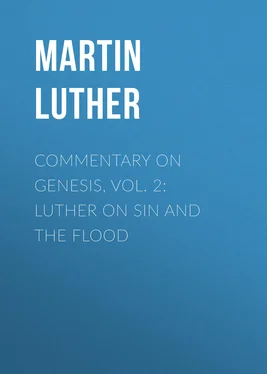Martin Luther - Commentary on Genesis, Vol. 2 - Luther on Sin and the Flood
Здесь есть возможность читать онлайн «Martin Luther - Commentary on Genesis, Vol. 2 - Luther on Sin and the Flood» — ознакомительный отрывок электронной книги совершенно бесплатно, а после прочтения отрывка купить полную версию. В некоторых случаях можно слушать аудио, скачать через торрент в формате fb2 и присутствует краткое содержание. Жанр: foreign_prose, foreign_religion, Философия, foreign_psychology, foreign_antique, на немецком языке. Описание произведения, (предисловие) а так же отзывы посетителей доступны на портале библиотеки ЛибКат.
- Название:Commentary on Genesis, Vol. 2: Luther on Sin and the Flood
- Автор:
- Жанр:
- Год:неизвестен
- ISBN:нет данных
- Рейтинг книги:4 / 5. Голосов: 1
-
Избранное:Добавить в избранное
- Отзывы:
-
Ваша оценка:
- 80
- 1
- 2
- 3
- 4
- 5
Commentary on Genesis, Vol. 2: Luther on Sin and the Flood: краткое содержание, описание и аннотация
Предлагаем к чтению аннотацию, описание, краткое содержание или предисловие (зависит от того, что написал сам автор книги «Commentary on Genesis, Vol. 2: Luther on Sin and the Flood»). Если вы не нашли необходимую информацию о книге — напишите в комментариях, мы постараемся отыскать её.
Commentary on Genesis, Vol. 2: Luther on Sin and the Flood — читать онлайн ознакомительный отрывок
Ниже представлен текст книги, разбитый по страницам. Система сохранения места последней прочитанной страницы, позволяет с удобством читать онлайн бесплатно книгу «Commentary on Genesis, Vol. 2: Luther on Sin and the Flood», без необходимости каждый раз заново искать на чём Вы остановились. Поставьте закладку, и сможете в любой момент перейти на страницу, на которой закончили чтение.
Интервал:
Закладка:
215. Also Naaman, and the king of Nineveh, and Nebuchadnezzar, and Evilmerodach, and others from among the Gentiles, were saved by such uncovenanted mercy; for, unlike the Jews, they had no promise of Christ. In the same way, bodily safety is vouchsafed to Cain, and a wife with offspring, for the sake of the elect to be saved by uncovenanted mercy. For, although what we said of the Moabites is true of all his posterity, that it was to live under a curse, it is true, notwithstanding, that some of the patriarchs took their wives from the same.
V. 15a. And Jehovah said unto him, Therefore whosoever slayeth Cain, vengeance shall be taken on him sevenfold.
216. Jerome, in his Epistle to Damascus, contends that Cain had begged of the Lord that he might be slain, an opinion into which he rushes full sail, as it were, entertaining no doubt whatever concerning its truth. Lyra follows Jerome, and resolutely affirms that the context requires this interpretation. But this error of theirs should be laid at the door of the rabbins from whom they received it. The true sense of the passage is rather that everyone was prohibited from killing Cain. Judgment is pronounced here by God, and when he spares Cain's life and in addition permits him afterward to marry, it is done to stay its execution.
217. Moreover, how is it likely that an ungodly person asks death at the very time when God exercises judgment? Death is the very punishment of sin; therefore he flees and dreads death as the greatest part of his penalty. Away, therefore, with such vagaries of the rabbins! With these also Lyra's suggestion may safely be classed that the text ought to be divided and made to mean, Whoever shall kill Cain, shall surely meet with severe punishment. And when it is further stated, He shall be punished sevenfold, they would explain it as meaning that in the seventh degree—in the seventh generation—the punishment is to be inflicted.
218. Such vagaries are worthy of the rabbins after having cast away the light of the New Testament. However, they impose a double labor upon us, inasmuch as we are compelled to defend the text and to clear it of such corruptions, and to correct their absurd comments. If I quote them occasionally, it is to avoid the suspicion of proudly despising them, or of failing to read, and to give sufficient consideration to, their writings. While we read them intelligently, we do so with critical discrimination, and we do not permit them to obscure Christ, and to corrupt the Word of God.
219. The Lord, accordingly, does not in this passage at all alter the sentence upon Cain whereby he had been doomed to a curse on earth, but merely vouchsafes to him this uncovenanted mercy for the sake of the elect that are to be saved from that curse as from a mass of dregs. That is the reason he said Cain should not be killed, as he feared.
There is, then, no necessity for doing violence to this text as Rabbi Solomon does, who, after the words "whosoever slayeth Cain," puts a stop; making it to be a hiatus or (ellipsis), as we find in that noted line in Virgil (Aeneas, 135)—
And then the expression, "shall be punished sevenfold," the rabbi refers to Cain himself, who was punished in his seventh generation. For Cain begat Enoch, and Enoch begat Irad, and Irad begat Mehujael, and Mehujael begat Methusael, and Methusael begat Lamech.
220. And the Jews' absurd comment upon that passage (verse 23, below), is that Lamech, when he was old, and his eyes dim, was taken by his son Tubal-Cain into a wood to hunt wild beasts, and that, when there shooting at a wild beast, Lamech accidently shot Cain, who in his wanderings had concealed himself in the wood. Such interpretations are only fables, unworthy a place or notice in our schools. Moreover, they militate against the very truth of the text. For if Cain was really designed of God to be killed in the seventh generation, and if that time was thus fixed for his death, he was not "a fugitive and a vagabond upon earth."
221. We condemn, therefore, this interpretation of Rabbi Solomon, on the ground of critical discrimination, because it militates directly against that sentence which God had before pronounced; and God is not man, that he should change his mind, 1 Kings 15, 29-30. This rule should be strictly observed in all interpretation of the Holy Scripture, that the rendering of one passage must not subsequently conflict with that of another. And when the rabbins, moreover, say that the deluge was the particular punishment of Lamech's sin in thus killing Cain, Lyra refutes them. He very truly affirms that the deluge was the common punishment of the whole world of wicked men. We leave, therefore, all these Jewish absurdities and hold fast the true meaning of the text before us, that, when Cain feared lest he should be slain by any one who should find him, the Lord prevented him from being thus slain, and denounced on such murderer a punishment sevenfold greater than that of Cain.
222. And, though Lyra argues and inquires how it could be that he who should slay Cain could deserve a sevenfold greater vengeance than Cain deserved, who slew his own brother, of what profit is it to us to inquire into the counsel of God in such matters as these, especially when it is certain that God permitted his mercy to stray to Cain in the form of promises and blessings under the Law, if I may so express myself, thus securing his safety.
223. There are two kinds of promises, or a twofold promise, as we have often explained. There are the legal promises, if I may so call them, which depend, as it were, upon our own works, such as the following: "If ye be willing and obedient, ye shall eat the good of the land," Is 1, 19. Again, I am God, showing mercy unto thousands of them that love me and keep my commandments, Ex 20, 6. And also above, in this case of Cain, "If thou doest well, shall not thy countenance be lifted up?" Gen 4, 7. And these legal promises have for the most part their corresponding threats attached to them.
But the other kind of promises are promises of grace, and with them no threats are joined. Such are the following: "Jehovah thy God will raise up unto thee a prophet from the midst of thee, of thy brethren, like unto me; unto him ye shall hearken," Deut 18, 15. Again, "I will put my law in their inward parts, in their heart will I write it; and I will be their God, and they shall be my people," Jer 31, 33. And again, "I will put enmity between thee and the woman," Gen 3, 15. Now, these promises depend not in any way upon our works, but absolutely and only upon the goodness and grace of God, because he was pleased to make those promises and to do what he thus promised. Just in the same way we have the promise of Baptism, of the Lord's Supper, and of the Keys, etc., in which God sets before us his good will and his mercy and his works.
224. Now, God gave no promise of the latter kind to Cain. He only said to him, Whosoever shall slay thee shall be punished sevenfold. But Adam had such a promise of grace made to him. And Cain, because he was the first-born, ought to have received that promise as an inheritance from his parents. That promise was the large and blessed promise of eternal glory, because by it the seed was promised which should bruise the serpent's head, and this without any work or merit of man. For that promise had no condition attached to it, such as, If thou shalt offer thy sacrifices, if thou shalt do good, etc.
225. If, therefore, you compare this promise of grace with the words God spake to Cain, the latter are as a mere crust held out to a beggar. For even Cain's life is not promised him absolutely. Nothing more is said than a threat pronounced against those who should slay him. God does not say positively, No man shall slay thee. He does not say, I will so overrule all others that no one shall slay thee. Had the words been thus spoken, Cain might have returned into the presence of God and of his parents. But a command only is given to men that they slay not Cain. If, therefore, the words spoken to Cain be at all considered as a promise, it is that kind of promise which, as we have before said, depends on the works and will of man. And yet, even such promise is by no means to be despised, for these legal promises often embrace most important things.
Читать дальшеИнтервал:
Закладка:
Похожие книги на «Commentary on Genesis, Vol. 2: Luther on Sin and the Flood»
Представляем Вашему вниманию похожие книги на «Commentary on Genesis, Vol. 2: Luther on Sin and the Flood» списком для выбора. Мы отобрали схожую по названию и смыслу литературу в надежде предоставить читателям больше вариантов отыскать новые, интересные, ещё непрочитанные произведения.
Обсуждение, отзывы о книге «Commentary on Genesis, Vol. 2: Luther on Sin and the Flood» и просто собственные мнения читателей. Оставьте ваши комментарии, напишите, что Вы думаете о произведении, его смысле или главных героях. Укажите что конкретно понравилось, а что нет, и почему Вы так считаете.












